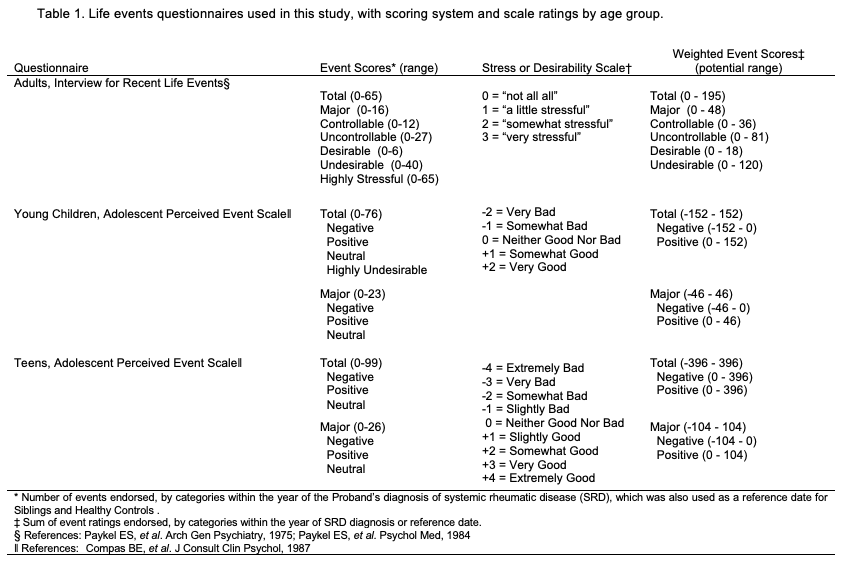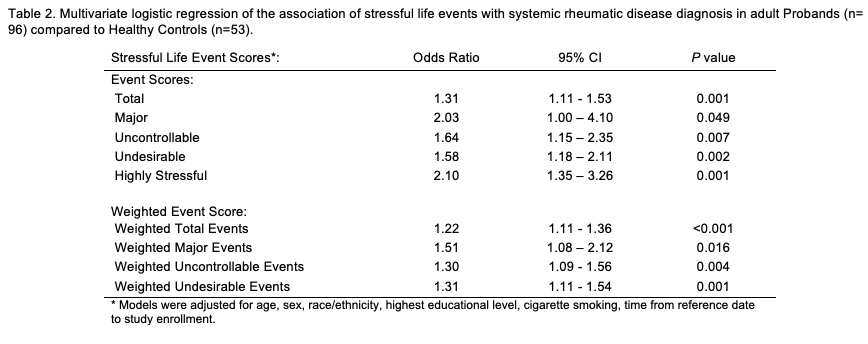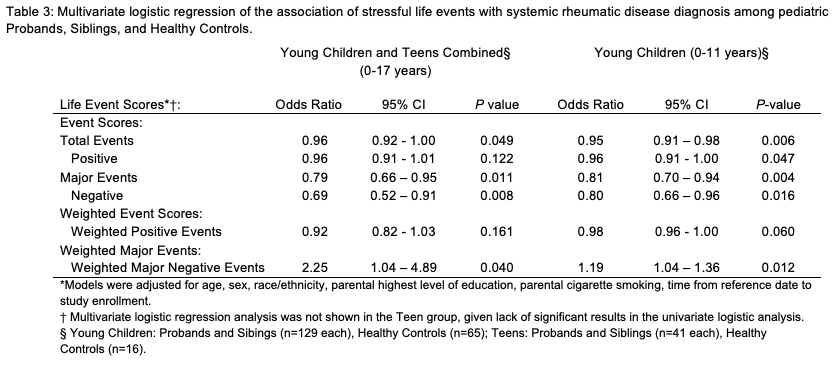Session Information
Session Type: Poster Session A
Session Time: 9:00AM-11:00AM
Background/Purpose: Systemic rheumatic diseases (SRDs) are complex multi-organ immune-mediated disorders that arise from the interaction of environmental exposures in genetically predisposed individuals. Stressful life events have been associated with disease flares and progression, but their impact on SRD development is unclear. This study explored the association between life events, psychosocial stress, and the development of SRD in adult and pediatric siblings discordant for SRDs.
Methods: Life events data from the NIEHS Study of Twins or Siblings Discordant for SRDs was examined in 96 Adults, 129 Children (YC, 1-11 years), and 41 Teen (12-17 years) Probands within 5 years of diagnosis of one of four SRDs, and in their same gender unaffected Siblings (SIBs) and Healthy Controls (HCs), within 5 years of Probands’ ages. Life events in the year prior to SRD diagnosis were queried using validated questionnaires, adapted from Paykel’s List of Recent Life Events for adults and the Adolescent Perceived Event Scale for YC and Teens. Life events were categorized and rated by their associated stress or desirability (Table 1). The same reference period was used for SIBs and HCs. Pediatric questionnaires were completed by parents. Unconditional and conditional logistic regression were used to calculate odds ratios (OR) of SRD diagnosis.
Results: In adults, the number of total, uncontrollable, undesirable, and highly stressful life events was higher in probands compared to HCs (P values < 0.01–0.03), but there was no difference in the frequency of life events between Probands and SIBs. Perceived stress ratings in the same categories were higher in Probands compared to HCs (P-values < 0.01–0.04). In the YC and Teen combined analysis and in the YC group alone, probands had fewer positive and total life events than HCs (P≤0.04). These events were rated as more desirable by YC HCs than by Probands (P≤0.05). From multivariate logistic regression analyses, adjusted for demographics, time from reference date to study enrollment, and smoking, the number of total, major, uncontrollable, undesirable, and highly stressful life events and their corresponding stress ratings were associated with an increased odds of SRD diagnosis in adult Probands compared to HCs (OR 1.22–2.03, P values ≤0.05, Table 2). The frequencies of total, major negative, and major total events were associated with SRD diagnosis in YC and Teens combined (OR 0.69–0.96, P values ≤0.05, Table 3), and in YC alone. However, higher undesirable ratings for major negative life events were associated with SRD diagnosis in children (OR 2.25, P=0.04).
Conclusion: This retrospective study suggests that negative life events and their stress perception are associated with greater odds for SRD in adult Probands compared to HCs. The relationship between life events and SRD diagnosis is more nuanced in the pediatric group, where more frequent life events were associated with a lower odds of SRD, but a greater perception of undesirability with major negative life events was associated with subsequent SRD diagnosis. These findings support the need for better understanding the role of stress in the development of SRD.
To cite this abstract in AMA style:
Bauer Ventura I, Goldberg M, Schiffenbauer A, Shi M, Volochayev R, H. Jackson S, Jansen A, Bayat N, Parks C, R. Weinberg C, Picardi A, Miller F, Rider L. Stressful Life Events in the Year Prior to Their Diagnosis Are Associated with Adult and Pediatric Systemic Rheumatic Diseases [abstract]. Arthritis Rheumatol. 2023; 75 (suppl 9). https://acrabstracts.org/abstract/stressful-life-events-in-the-year-prior-to-their-diagnosis-are-associated-with-adult-and-pediatric-systemic-rheumatic-diseases/. Accessed .« Back to ACR Convergence 2023
ACR Meeting Abstracts - https://acrabstracts.org/abstract/stressful-life-events-in-the-year-prior-to-their-diagnosis-are-associated-with-adult-and-pediatric-systemic-rheumatic-diseases/



